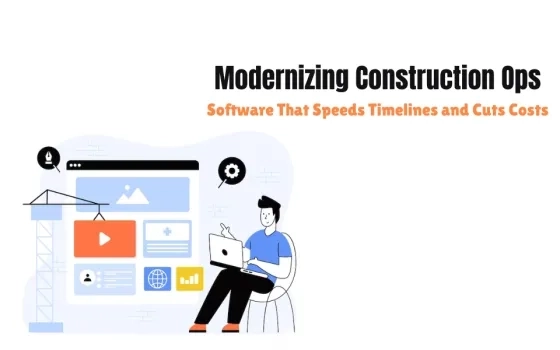Introduction
The construction industry is undergoing a digital revolution. As projects become more complex and timelines more aggressive, companies increasingly rely on modern construction software to stay competitive. These digital tools are transforming traditional workflows, replacing outdated manual processes with automated systems that bring speed, accuracy, and transparency to every construction phase.
Modern construction operations now demand more than just skilled labor and materials—they require centralized platforms that connect teams, streamline communication, and provide real-time project visibility. From pre-construction planning to final handover, digital solutions ensure that no detail slips through the cracks. Whether it’s scheduling, budgeting, resource allocation, or compliance management, software tools now play a pivotal role in reducing delays and avoiding costly errors.
The rising adoption of construction management software and construction ERP solutions is a clear indicator of the industry's shift towards smarter, tech-enabled operations. These tools offer contractors, engineers, and stakeholders the power to work more collaboratively, make data-driven decisions, and deliver projects faster and within budget. In an industry where time is money, modern software is no longer a luxury—it’s a necessity.
The Evolving Needs of Construction Projects
Construction projects today are no longer simple, single-site efforts—they are large-scale, multifaceted operations involving multiple teams, remote collaboration, tight timelines, and demanding stakeholders. These evolving demands are driving the industry to embrace software solutions that support faster decision-making, seamless coordination, and flexible project management.
As project scopes grow, so does the complexity of managing them. Manual methods and disconnected tools create bottlenecks and communication breakdowns. That’s why many firms are transitioning to digital solutions such as construction project management software to unify their operations and increase efficiency across all departments.
Remote work and mobile access have also become key elements in modern construction. With teams often spread across different job sites and time zones, there’s a need for cloud-based systems that offer real-time updates and centralized access to data. Integrated platforms are filling this gap by enabling on-the-go collaboration and centralized project oversight.
In response to these changes, the adoption of comprehensive platforms that bring scheduling, budgeting, documentation, and compliance together in one place is rising rapidly. These solutions not only enhance operational control but also support the industry’s push for faster, safer, and more predictable project outcomes.
Core Benefits of Construction Software
Modern construction software brings a range of advantages that are reshaping how projects are executed. Here are the core benefits that matter most:
1. Real-Time Communication & Collaboration: Construction software enables seamless communication between field teams, office staff, subcontractors, and clients. Live updates, centralized chats, and shared access to documents ensure everyone is aligned, reducing miscommunication and delays.
2. Streamlined Scheduling and Resource Allocation: With built-in scheduling tools, teams can plan timelines more effectively and assign resources based on availability and need. This avoids duplication of effort and ensures materials, machinery, and manpower are where they need to be, when they’re needed.
3. Cost Control and Budget Visibility: Real-time cost tracking tools allow project managers to monitor budgets closely, forecast expenses, and identify cost overruns early. Many construction ERP solutions offer financial dashboards that consolidate cost data for better decision-making.
4. Centralized Documentation and Compliance: Gone are the days of misplaced blueprints and scattered paperwork. Construction software stores all documents—contracts, permits, change orders, RFIs—in a centralized, cloud-based location. This ensures compliance with regulatory standards and simplifies audits.
By adopting platforms that incorporate these benefits, companies can boost productivity, reduce risks, and ensure projects are completed on time and within budget.
Key Features to Look For
Choosing the right software for your construction business means looking beyond the basics. Here are the top features to prioritize:
1. Project Tracking Dashboards: Interactive dashboards provide real-time insights into progress, costs, schedules, and resource utilization. This feature empowers project managers to make proactive decisions and mitigate delays.
2. Financial Forecasting Tools: Budgeting modules integrated into construction management software allow for precise cost estimation and real-time forecasting. These tools are vital for controlling cash flow and avoiding overruns.
3. Workflow Automation: Automation features help eliminate repetitive tasks such as report generation, approvals, and data entry. This not only speeds up operations but also minimizes human error.
4. Mobile Accessibility: With mobile apps and cloud connectivity, teams can access project data from the field. This boosts flexibility and ensures issues can be addressed without delay, regardless of location.
5. Integration with BIM and CAD Systems: Advanced software solutions now support seamless integration with Building Information Modeling (BIM) and CAD tools. This allows teams to visualize designs, detect clashes, and plan construction more effectively.
These features ensure your software investment not only simplifies project management but also scales with your business needs.
Enterprise-Level Adoption
Large construction firms are embracing enterprise-grade digital platforms to manage their multi-site, multi-phase projects. Enterprise construction software offers the scalability, customization, and analytics capabilities needed for complex operations that involve hundreds of stakeholders and millions in capital investment.
One of the biggest advantages of these platforms is data centralization—all teams, departments, and contractors can work off the same source of truth. This eliminates information silos, ensures consistency, and improves accountability at every level.
These solutions also integrate with legacy systems such as accounting platforms, CRM tools, and procurement databases, allowing large organizations to transition smoothly without overhauling their entire tech stack. Built-in analytics and reporting provide real-time performance metrics, which enable executives to spot trends, make informed decisions, and align projects with strategic goals.
Moreover, enterprise platforms support custom workflows, user roles, and permissions, making them ideal for organizations with complex governance structures. For large construction companies aiming to maximize ROI and maintain a competitive edge, adopting an enterprise-grade software solution is a smart move.
Conclusion:
The construction landscape is rapidly changing, and the pressure to deliver faster, cheaper, and more efficiently has never been greater. Construction software offers a smart, scalable way to meet these demands. By centralizing project management, improving communication, and enhancing cost control, these tools are revolutionizing the way the industry works.
With built-in features that support everything from scheduling to financial planning and compliance tracking, software platforms empower companies to reduce risks, avoid costly delays, and stay ahead of competitors. Whether you’re managing a single project or running a nationwide enterprise, the right software can deliver measurable improvements in every aspect of your operation.
In today’s data-driven world, construction businesses can no longer afford to rely on spreadsheets and manual systems. Embracing digital tools isn’t just about modernizing processes—it’s about ensuring long-term success. The future of construction lies in smart, connected, and agile systems. Now’s the time to invest

























